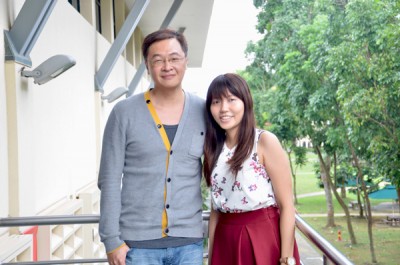Young Children’s Voices in Mathematical Problem Solving
Contributed by Dr Ho Siew Yin and Sng Wei Qin Abbie, from NTUC First Campus, for SingTeach Virtual […]
Read More
A confident teacher would have a positive impact on his or her students’ achievement, attitude, affective and even socio-emotional growth. To improve the schooling experience of low progress learners, enhancing teachers’ beliefs in their teaching competence may be a viable approach.
Teacher efficacy is one of the few characteristics that can reliably predict students’ learning outcomes. Teachers’ beliefs in their teaching capabilities could affect how they perceive, approach and teach their students.
To help low progress (LP) students who are not doing well in schools, one way would be to look at their teachers’ efficacy and what can be done to make the teachers feel more confident about their teaching capability.
NIE Research Scientist Dr Josh Wang and his colleagues did classroom observations of teachers who taught LP students and interviewed teachers with high and low efficacy in teaching LP students.

Josh Wang and Natalie Lim believe that a teacher’s efficacy affects the learning experience for low progress learners in schools.
Why is it so important for LP students to be taught by teachers who feel confident about their teaching capability?
Researchers who studied LP students found that they have a very specific set of cognitive and psychological needs.
“From our data, it seems that the high efficacy (HE) teachers understand the LP students better. They knew more about their psychological and cognitive needs,” says Josh.
“Our findings also reveal that the HE teachers were more capable of employing effective strategies in giving instructions, engaging LP students and managing their classrooms than the low-efficacy (LE) teachers.”
For example, Josh observed that the HE teachers were more capable of employing a variety of strategies to retain attention of LP students in classes. For LE teachers, fewer strategies were used and students’ engagement was observed to be lower.
“For the HE teachers, you could see the difference is that the majority of the class listened to them, and the students were interacting with a higher level of engagement,” he says. For LE teachers, the teachers tended to focus only on students who were motivated to learn.
How did teachers with a higher sense of efficacy develop it? Can other teachers achieve it too? Josh shares that the research literature has identified four main psychological sources of efficacy information associated with teacher efficacy.
Receiving positive feedback can affect one’s thinking and behaviour positively. Likewise, receiving negative feedback can cause negative effects on one’s beliefs and practice. “Words can affect one’s behaviour,” Josh says. “If people around you keep telling you that you are doing a good job, it might make you believe that you can really do a good job!”
“Your experiences of successes or failures in the past will affect your perceptions of your own ability,” says Josh. This would in turn shape teachers’ beliefs about their teaching capability.
“Let’s say if your previous batch of students did really well in exams, you might feel that you are able to help students in the future in the similar manner. But if your experiences weren’t very successful, then these experiences might make you feel that you don’t have the ability to help your students,” says Josh.
A teacher who observes other teachers tends to reflect on his or her teaching ability. “If you see someone who has very similar training background or teaching experience as you do, and doing a good job in the classroom,” Josh notes, “it might make you believe that maybe you can do so too.” However, seeing someone with a similar background and who is struggling in the classroom will make one think that he or she may not be able to perform well.
How a teacher feels when standing in front of the classroom and facing his or her students would affect his or her perception of teaching capability. Research Assistant Miss Natalie Lim explains that teachers who feel relaxed and calm in front of the classroom tend to be more confident about their teaching competence.
“Students are able to pick up their teacher’s vibes,” she adds. “Teachers with low efficacy tend to give off an edgy vibe.” Also, students have the tendency to “test” teachers by being disruptive in the classroom. This, in turn, may also lead to a decrease of efficacy in teachers.
Our findings also reveal that the high-efficacy teachers were more capable of employing effective strategies in giving instructions, engaging LP students and managing their classrooms than the low-efficacy teachers.
– Josh Wang, Office of Education Research
Josh and his team are interested to find out how best to help LE teachers in teaching LP students. After all, at the end of the day, LP students will benefit from teachers with high efficacy the most.
Through interviews and classroom observations, the research team also discovered three non-psychological sources of efficacy information that affected the level of teacher efficacy in teaching LP students (see box story below). Unlike the four psychological sources, these sources can be addressed much more easily.
Teacher efficacy affects teaching effectiveness, Josh says. To ensure the best for LP learners, he suggests that the first step to increase teacher efficacy could be through teacher learning programmes.
“These programme should help our teachers understand LP students more,” he says. “That includes their cognitive, emotional and psychological needs.”
The research team plans to expand their research further by designing interventions for teachers to enhance their efficacy. Meanwhile, Natalie feels that “schools can also have, for example, more senior or experienced teachers who are more effective in teaching LP students to mentor new and inexperienced teachers.”
While the impact may not surface overnight, Josh and his team believe that their research efforts can help teachers raise their sense of efficacy and in turn provide a more positive learning experience for LP learners in schools.